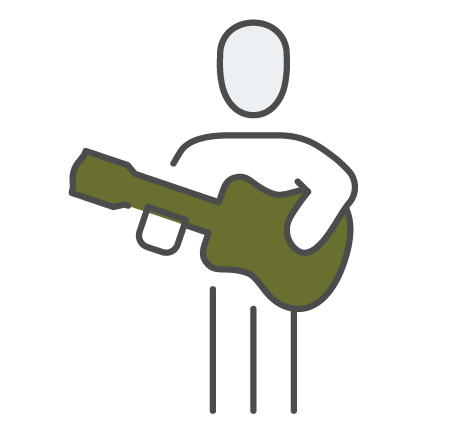THE MUSIC INCLUSION PROGRAME
The Music Inclusion Program will leverage advances and will support inclusive music by
removing individual and systemic barriers of access due to disability in the IDF.
Why Music?
Music stimulates areas of the brain that, in people with disabilities, are weak or damaged. Music builds and strengthens the auditory, visual/spatial, and motor cortices of the brain. These areas are tied to speech and language, social skills, reading and reading comprehension.
Studies indicate that when young people with disabilities learn a musical instrument, improvements are seen in attention span, concentration, impulse control, social functioning, self-esteem, self-expression, motivation, and memory. Studies have also shown that children and young adults who have difficulty focusing when “background noise” is present are particularly helped by music.
Music is a way through which people with special needs can channel intense emotions and energy. It aids them in focusing and connecting to the world. It is a transcendent medium that connects different populations; an exciting social tool that shares the musician’s feelings while inspiring the listeners’ feelings.
The positive impact of music on social skills has been demonstrated beyond people with disabilities. Neuro-typical children and young adults are more likely to play and get along following a shared musical experience. Joint musical interactions can enhance emotional empathy, prosociality and bonding.
Program Goals:
The musical program’s aim is to further integrate our Special in Uniform soldiers. This is an opportunity to experience the military (as do most other young Israelis) while expanding their social skills. Music is uniquely interactive. The goal of the Music program is to expose those with autism and other disabilities to an environment where individual differences are celebrated and where no one will be embarrassed.
Serving in the IDF generally, and participating in music, encourages our special needs youths to become secure and independent soldiers who integrate into society. The time spent in military service seemingly and miraculously improves participants’ social skills, basic life skills, and instills in them a belief in their abilities. In doing so, they find themselves able to contribute to society to the best of their ability.
Program advantages:

Increasing independence

Cognitive development

Learning how to work in a group

Learning the language of music

Occupational Therapy

Audience engagement
The music program includes:
Establishment of a Special in Uniform band
• Build a recording studio and rehearsal room.
• Purchase of professional musical instruments for performances and work.



